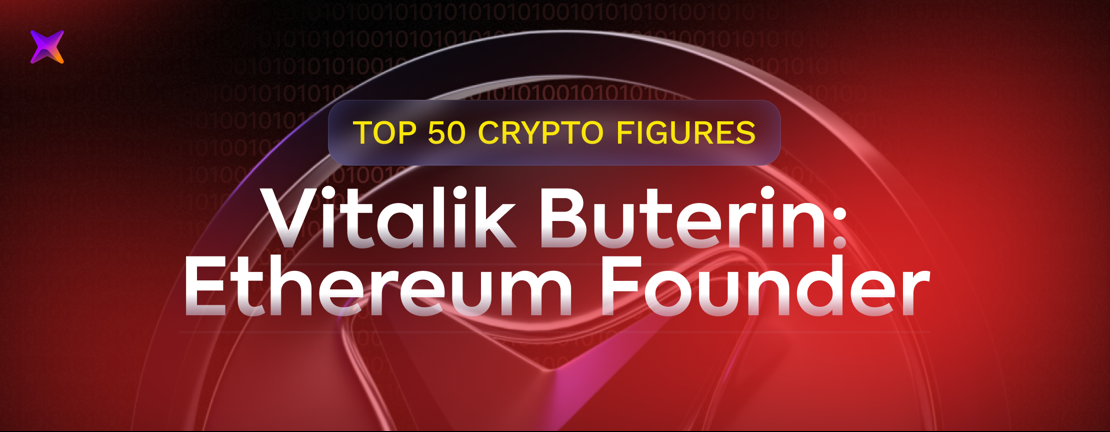Published 19 May 2025
Vitalik Buterin: Ethereum Founder and Web3 Visionary

Who Is Vitalik Buterin?
Vitalik Buterin is best known as the creator of Ethereum — the blockchain that made smart contracts and decentralized apps possible. He launched Ethereum in 2015, when he was just 21. By age 27, he became the world’s youngest crypto billionaire after ETH passed $3,000.
Before Ethereum, Vitalik co-founded Bitcoin Magazine in 2012. In 2013, he published the white paper that would become the blueprint for Ethereum. A year later, he won a $100,000 Thiel Fellowship and committed full-time to building the platform. Ethereum’s goal from the start was clear: create a more flexible blockchain than Bitcoin — one that developers could build on.
How Vitalik Buterin Got Into Crypto
Vitalik first heard about Bitcoin from his father in 2011. At 17, he was skeptical but curious. What drew him in wasn’t the money — it was the idea. A currency with no central authority? That fascinated him.
He didn’t have money to invest, so he earned his first bitcoins by writing articles — 5 BTC per piece, worth about $3.50 back then. He spent hours reading about cryptography and decentralized systems. Instead of trading, he focused on learning how it all worked.
In 2012, he co-founded Bitcoin Magazine. He wrote detailed articles explaining how blockchain technology works and what it could change. His early writing already showed a clear interest in building systems that resist censorship and reduce reliance on middlemen.
But he also saw Bitcoin’s limits. Its scripting language was too simple. You couldn’t build real apps on top of it. By 2013, Vitalik proposed changes to fix this — but most of the Bitcoin community said no. That’s when he realized: if he wanted a programmable blockchain, he’d have to create it himself.
Why He Created Ethereum
In late 2013, Vitalik wrote the Ethereum white paper. His idea was simple: create a blockchain that developers could actually build on. Not just a payment network, but a full platform for apps.
In early 2014, he and a small team — including Mihai Alisie, Charles Hoskinson, Gavin Wood, and others — announced Ethereum to the public. They raised over 31,000 BTC (about $18 million at the time) through a token sale to fund development. Vitalik also got a $100,000 Thiel Fellowship to work on the project full-time.
Ethereum launched in July 2015. Its first version, called “Frontier”, marked the start of a new kind of blockchain. Instead of just sending coins, you could now write code that would run on-chain — automatically and without a middleman.
The core idea was smart contracts. These are bits of code that run exactly as written, with no one able to change the outcome. It was a big leap from Bitcoin’s basic scripting tools. Ethereum used a Turing-complete language, meaning it could handle almost any kind of logic or function.
Vitalik didn’t want to patch Bitcoin. He wanted to build something new — a flexible base layer for decentralized apps of all kinds.
What He Writes About in His Blog
Vitalik doesn’t just build. He writes — a lot. His personal blog is where he shares how he thinks about the future of Ethereum and Web3. It’s not just about tech. He dives into governance, funding, privacy, and how decentralized systems can change society.
Decentralization Isn’t Just Technical
Vitalik sees decentralization on three levels: architecture, politics, and logic. It’s not enough for systems to run on multiple servers. You also need fair decision-making and open participation. That’s how you avoid power getting concentrated — whether in companies or governments.
Quadratic Funding
One of his big contributions is the idea of quadratic funding. It’s a way to fund public goods by rewarding projects that get support from many small donors, not just a few big ones. The more people chip in, the bigger the matching funds. Gitcoin has used this model successfully.
DAOs and Shared Power
Vitalik supports DAOs but admits they aren’t perfect. He says some decisions — like military actions — work better with centralized control. But when it comes to funding or governance, decentralization often leads to better, fairer outcomes. The key is distributing power so no single person or group controls everything.
Privacy and Identity
He believes privacy is essential. Whoever holds your data has power over you. That’s why he supports zero-knowledge proofs and selective disclosure. For example, you could prove you’re over 18 without sharing your name or full ID. As AI gets better at collecting data, privacy tools become even more important.
Criticism of Hype
Vitalik often calls out projects that chase hype over substance. He’s openly skeptical of memecoins and quick-profit schemes. His focus is always on what actually works — and what helps people long-term.
What’s Next for Ethereum, According to Vitalik
Vitalik often shares where he thinks Ethereum should go — long before it becomes official. He’s focused on scaling, usability, and keeping the core values of the network intact.
Scaling with Layer 2
He’s all in on Layer 2 solutions. Rollups, like Optimism and Arbitrum, already boosted Ethereum’s capacity 17 times. But for him, that’s just the start.
He says rollups should reach “stage 1+” decentralization — where at least 26% of the security council is fully independent. Without that, he won’t support them. He also wants all rollups to feel like one Ethereum — not a bunch of disconnected mini-chains. As he put it, “Ethereum should feel like one ecosystem, not 34 different blockchains.”
AI Meets Crypto
Vitalik sees real potential in AI — but only when it solves actual problems. He’s interested in AI bots that act as users in systems like prediction markets or DEXs. He also likes AI tools that make crypto safer and easier to use, like warning people before signing risky transactions.
The Big Picture
Vitalik still wants Ethereum to be the base layer for a more open internet. That means fast finality, better contract execution, and more privacy. He’s proposed replacing the current virtual machine with RISC-V architecture — which could make Ethereum 100 times more efficient.
For him, Ethereum isn’t just about tech. It’s about giving people real tools — for saving money, sharing data, or building communities — without needing permission from anyone.
Conclusion
Vitalik Buterin isn’t just the guy who created Ethereum. He’s one of the clearest thinkers in crypto — someone who cares as much about people and systems as he does about code.
From the start, he saw that Bitcoin wasn’t enough. He wanted more than a currency — he wanted a platform. Ethereum became that platform, giving developers a place to build apps that run on their own rules.
Through his blog, Vitalik keeps shaping how Web3 evolves. He supports new ideas like quadratic funding, pushes for real decentralization in DAOs, and defends privacy in an age of surveillance. He criticizes hype and focuses on what brings long-term value.
His roadmap for Ethereum is technical — but the goal is simple: make a system that works, scales, and stays true to the core idea of decentralization. For Vitalik, Ethereum isn’t just software. It’s a new way to organize people, power, and trust online.
Read More




 Get RateX Pro
Get RateX Pro

 14 May 2024
14 May 2024
